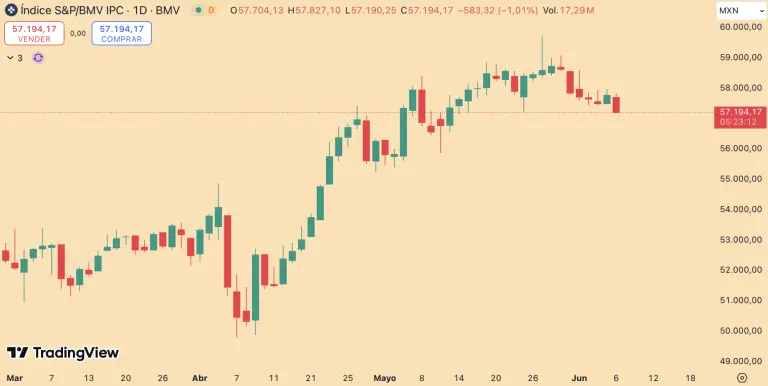Overview of the Current Market Situation
Mexico’s stock market is experiencing significant losses in the morning of this Friday. Local stock indices are declining, setting the stage for a week with accumulated losses following an interruption of five consecutive downturns.
The benchmark S&P/BMV IPC, managed by the Bolsa Mexicana de Valores (BMV), which groups the most traded local stocks, is down by 1.01% at 57,194.17 points. The FTSE BIVA, operated by the Bolsa Institucional de Valores (Biva), is also in the red, falling 1% to a level of 1,153.93 points.

S&P/BMV IPC
Key Players and Their Performance
Within the reference index, most values are losing ground. The stocks of retail giant Walmex are leading the declines, dropping by 3.45% to 62.76 pesos, followed by airport operator Asur, down 2.57% to 605.58 pesos, and Alsea, off by 2.51% to 49.33.
Market Trends and Context
The S&P/BMV IPC has accumulated weekly losses of 1.15%, a movement that occurred just days after touching a new historical high on May 27. Year-to-date, the benchmark has gained more than 16 percent.
Impact on Investors and the Broader Economy
The recent downturn in Mexico’s stock market has implications for both local and international investors. As one of the largest emerging markets, Mexico’s performance can influence investor sentiment and capital flows in the region. The decline in key stocks, such as Walmex, Asur, and Alsea, may affect investor portfolios and create uncertainty in the market.
Key Questions and Answers
- Q: Who are the main players mentioned in this article?
The main players mentioned are Walmex, Asur, and Alsea, which are significant companies in Mexico’s stock market.
- Q: Why are these companies relevant?
These companies are crucial as they represent major sectors of Mexico’s economy, including retail (Walmex), airport services (Asur), and food services (Alsea). Their performance can indicate the health of these industries and, by extension, the broader Mexican economy.
- Q: How do their actions impact others?
Their stock performance directly affects investors who hold shares in these companies. Additionally, their actions can influence market sentiment and capital flows within Mexico and potentially in neighboring countries, given Mexico’s status as a significant emerging market.






